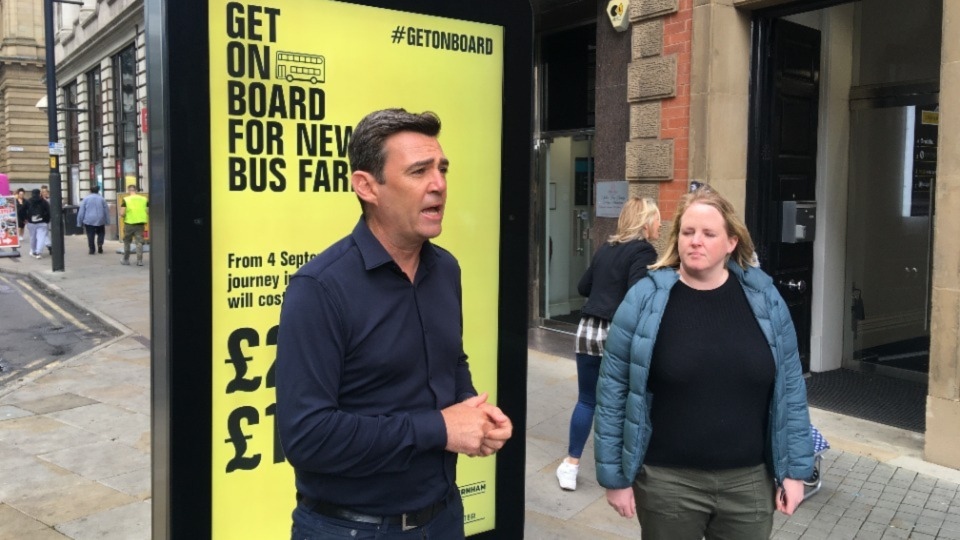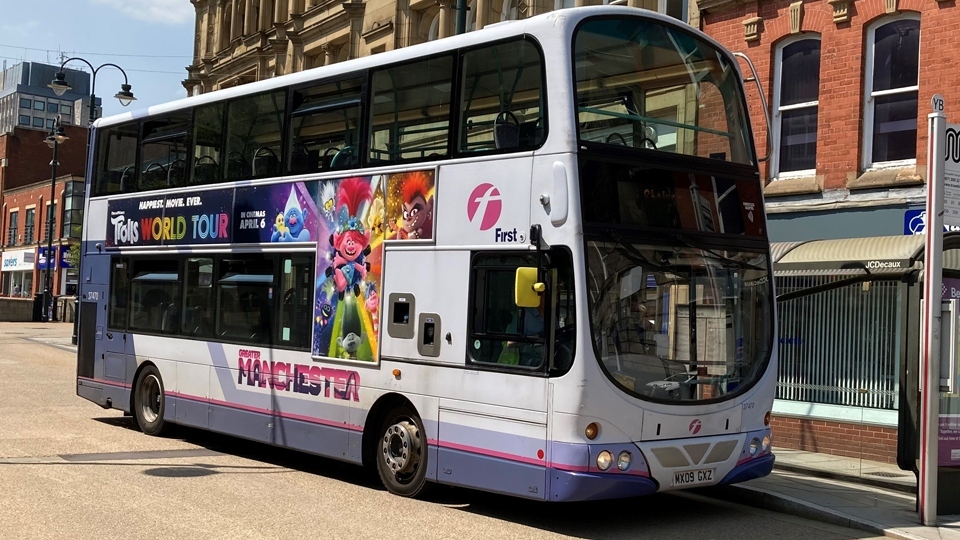Why the new bus fares ‘won’t make a difference’ for many - and some will pay more
Reporter: Joseph Timan, Local Democracy Reporter
Date published: 05 September 2022

Greater Manchester mayor Andy Burnham launches the Get On Board campaign with Oldham council leader Amanda Chadderton
Yesterday (Sunday) saw the start of a revolution for buses in Greater Manchester.
Single fares will be capped at £2 for adults and £1 for children, while day tickets which can be used on all bus services across the city-region will only cost £5.
The introduction of a new simplified fare structure comes 12 months before buses are brought back under public control for the first time since the 1980s.
The new franchising system for buses, which will start in Wigan and Bolton next September and be rolled out across the city-region by the end of 2024, will see companies bid for contracts to run routes chosen by local leaders.
Single fares were set to be slashed when the new system comes into force, but the scheme was fast-tracked to help people cope with the cost of living.
Mayor Andy Burnham says this is the biggest thing he has done as mayor of Greater Manchester – but he recognises that this is just the first step of the journey.
He hopes that cheaper, simpler fares will encourage people to ‘get on board’.
But for people who already use the bus regularly – many of whom buy weekly tickets which will not be capped – the new fares ‘won’t make a difference’.
And for some passengers, bus fares will rise by up to £4 a week.
‘It won’t make a difference to me’
On a mild Friday morning in Middleton, many bus passengers are blissfully unaware of the new fares which will be in force by the next working week.
The Local Democracy Reporting Service spoke to several people arriving, leaving or passing through Middleton on their regular commute by bus.
Some were supportive of slashing fares, but none believe they will benefit.
Elliot Symons rides the bus from Blackley three times a week, benefiting from Go North West’s Rochdale Road day saver fare which is currently priced at £4.
But now, this ticket will cost £4.70, or 20p less if bought on the app.
This is still cheaper than the new £5 multi-operator day ticket which will be introduced on the same day, but it will cost him more for this short journey.
“I think for many people it will help with everything going up,” he said.
“But it won’t make a difference to me.”
Debbie Holden usually travels from Rochdale to Middleton six days a week.
Like many people who use the bus every day to get to work, she opts for a weekly ticket which can be used on any operator and costs around £20.
The prices of these tickets went up in March, but will stay the same for now, so Debbie says she won’t save by switching to the new single or daily bus tickets.
“I don’t think it’s going to help a lot of people to be honest,” she said.
“Not unless they reduce the weekly ticket.”
The people who will pay more
Although single fares and day tickets will now be capped, some bus operators already charge less on certain services, so prices could increase.
Go North West’s cheapest one-way ticket for adults currently costs £1.50, but now this will be 10p more while weekly ticket prices will also increase.
An Adult 7-day ticket, which is currently £17.50, will cost £18.50 on the app or £20 on the bus, while a 28-day adult ticket increase rise from £62 to £67.
In contrast, single fares and day tickets for First buses are set to come down thanks to the cap, while weekly tickets bought on the bus will be priced at £18.
The fares on Diamond buses, which increased in March are not expected to rise again on Sunday, but when asked to confirm, the company did not reply.
Stagecoach’s weekly fares are also set to rise with some tickets scrapped.
The Manchester 7-day MegaRider will increase by £1 to £18.50, while the Magic Bus tickets will rise to £4.50 for a DayRider or £11 for a week.
However, the Middleton and Wigan weekly tickets will be scrapped altogether.
This means passengers in Wigan will pay £2.50 more for the Manchester 7-day MegaRider, while those in Middleton will have to pay £4 more per week.
Although this alternative ticket can take them all over Greater Manchester, those who just travel from Middleton to Manchester city centre do not care.
Diane Nichols, who is one of those people, is angry about the fare increase.

She uses the soon-to-be-scrapped 7-day Stagecoach ticket to get from her home in Middleton to Manchester city centre where she works part-time and to get to the shops or to see friends and family in her local town on other days.
“I don’t drive so I rely on this bus service,” she said.
“It just makes me feel that I don’t want to use this bus service anymore.
“But I’m a little bit stuck because it’s the only bus that comes up my lane.”
Middleton councillor Phil Burke, who sits on Greater Manchester’s transport committee, said he has spoken to many who will ‘lose out’ from the new fares.
He says people who use the bus to get to the city centre are being ‘penalised’ and has urged the mayor ask the bus operator not to scrap the weekly ticket.
Stagecoach says it is taking steps to simplify its range of tickets and make it easier for people to make unlimited journeys throughout Greater Manchester.
The bus operator claims the new capped fares will also save money for many.
A spokesperson said: “With the introduction of capped fares and the option of Stagecoach flexi day ticket bundles, nine out of 10 customers will either pay less for their bus fare or see the price of their travel frozen.
“We have consistently delivered some of the lowest ticket prices in the country and, with motoring costs accelerating, there has never been a better time to switch to the bus.”
“It’s not just about the fares”
Gary Nolan, chief executive of trade association OneBus which represents bus operators, said the price changes and capped fares coinciding is ‘coincidental’.
The deal with bus operators means that they will be no better or worse off financially from the capped fares because the difference will be subsidised.
He supports the £2 single fares, but says simplifying prices removes choice.
“The idea is to simplify the fares and make it more understandable,” he said.
“Hopefully this means more people will travel on buses
“But it removes a lot of choices people have if they’re regular bus users.”
The former bus conductor who has spent the last 20 years as a director for companies including Stagecoach says slashing single fares should encourage drivers to ditch their cars and ride the bus – but he says this is just the start.
Pauline Harding, who lives in Langley and works as a carer in Oldham and Chadderton, says it can take her up to two hours to get to work on the bus.
Since her bus timetable was reduced to every half hour, she has had to leave home at 8am to get to a 10am shift – and she doesn’t get home until 9.30pm.
Like many regular bus users, she won’t benefit from the new fares next week.
“It’s good if people don’t use the bus that often,” she said.
Fares aside, Nolan says a package of measures that make using a bus better value and faster than driving a car must be introduced in Greater Manchester.
This includes creating more bus lanes and prioritising buses at traffic lights.
He hopes that the government’s Bus Services Improvement Plan funding, which will be subsidising the capped fares, will be spent on such schemes too.
“If we’re going to bring people back onto buses, it’s got to be about more than just the fares,” he said.
“It’s got to be about the journey.”
So who will it benefit and how?
Confirming the new fares structure last month at the launch of the ‘Get On Board’ campaign, Oldham council leader Amanda Chadderton said capping bus fares could potentially save Greater Manchester residents up to £25m.
This is how much Transport for Greater Manchester (TfGM) estimates it will cost to reimburse bus operators for capping the single fares and day tickets.
But when buses are brought under public control, local leaders will set prices.
Mayor Mr Burnham says this is just the first step towards the Bee Network, the new London-style public transport system which he wants to create here.
He intends to integrate bus and tram tickets, setting a daily cap on spending.
However, he insists that the lower simpler fare structure for buses which will be introduced from Sunday will benefit many people, including existing users.
“It depends on people’s working patterns,” he said.
“Not everybody works every day.
“There’s a lot of people who are part-time workers who don’t get a weekly [ticket] because they won’t use it for five days.
“So it’s going to benefit people in different ways.”
He also believes that slashing single fares to £2 and day tickets to £5 may give drivers a cheaper alternative than the car as it becomes more costly to run.
Nevertheless, he has asked TfGM to look at whether the multi-operator weekly ticket can be capped at the lowest single-operator offer available.
But until the bus franchising system is in force, and at a time when passenger numbers are still below pre-pandemic levels, there is only so much he can do.
“This is only a step,” he said.
“There’s a lot more coming.”
Do you have a story for us? Want to tell us about something going on in and around Oldham? Let us know by emailing news@oldham-chronicle.co.uk , calling our Oldham-based newsroom on 0161 633 2121 , tweeting us @oldhamchronicle or messaging us through our Facebook page. All contact will be treated in confidence.
Most Viewed News Stories
- 1Man jailed following 'cowardly' assault on night out in Oldham
- 2800 cannabis plants seized following raid
- 3'Heart-broken' farmer's wife slams parking chaos at popular Greenfield beauty spot
- 4Mayor unveils his big taxi plan
- 5'Perverse' detective who was based in Oldham convicted of sexual offences, dismissed and banned...




